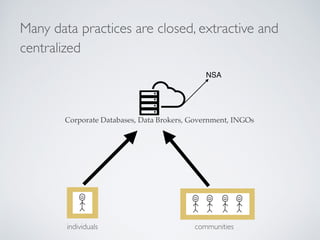Ethics and Data
- 1. ETHICS & DATA Discussing, teaching, enacting
- 2. The sheer amount of data we are generating is pretty insane ‚ùñ Banks! ‚ùñ Gyms! ‚ùñ Student loans! ‚ùñ Insurance companies! ‚ùñ Health care providers! ‚ùñ EZPass! ‚ùñ T-Pass! ‚ùñ Tech support calls! ‚ùñ Public records - Birth, Marriage, Death, Sale of property, ‚Ä® Legal proceedings! ‚ùñ Public Surveillance Cameras! ‚ùñ Future/Now: IoT, Wearables, DashboardCams, CopCams, Drones, Microlocation devices
- 3. Data is the method of the powerful, who have resources to acquire, store and make sense of large quantities of data.
- 4. Many data practices are closed, extractive and centralized individuals communities Corporate Databases, Data Brokers, Government, INGOs NSA
- 5. Open Data Movement - hope for more widely distributed access to data and know-how
- 6. CHALLENGES FOR OPEN DATA • Most corporate data & government data still not open. Many “accountability” data sets notably missing from open data. (Open Data Barometer report) • Data that you need doesn’t exist because it’s not in anyone’s interest to collect it (police killings) • Anonymized and aggregated data can be rematched to create personally identifiable information (AOL incident, Science/MIT Media Lab research, NYCTaxis and Celebrities) • Risk of data retained forever - not sensitive now but could be sensitive in future. • Data literacy gap to translate data into civic practices.
- 7. Often, just opening data is not enough.We see troubling cases of possible misuse of data. ❖ Target teenage pregnancy - Should corporate practices be able to bypass HIPAA regulations?! ❖ Predictive Parole - Should algorithms and personal data help determine parole?! ❖ The Mugshot Industry - Should public data feed into public shaming? Is this a violation of “innocent until proven guilty”?! ❖ Gun owners & the Journal News - Should journalists be able to publish gun owners’ home addresses?! ❖ 538 reports on “Nigerian Kidnappings” - Yikes. Even data journalists get things really, really wrong sometimes.! ❖ “Doxing” - Should we have consequences for doxing, which often uses public data to shame, harass or bully an individual?
- 8. WHAT IS IMPORTANTTOTEACH JOURNALISM STUDENTS ABOUT DATA & ETHICS?
- 9. WHAT I WANTTHEMTO LEARN ! • Case studies to see nuance • Data comes from material practices • Ecosystem of personal data • Data doesn’t have all the answers • Privacy concerns, protecting self and sources, assessing risk now and into the future • Nuts and bolts of tools (end-to-end encryption, deleting data securely, etc.)
- 10. CONTEXT • Journalism Undergrads and Grads • Professionally oriented, Like learning practical skills • Media savvy but not “techies” • They will read but I have to emphasize that they will need to “perform” the reading in some way in class • Class is studio-based; Prefer activities & projects to lectures & theory • Limited class time









